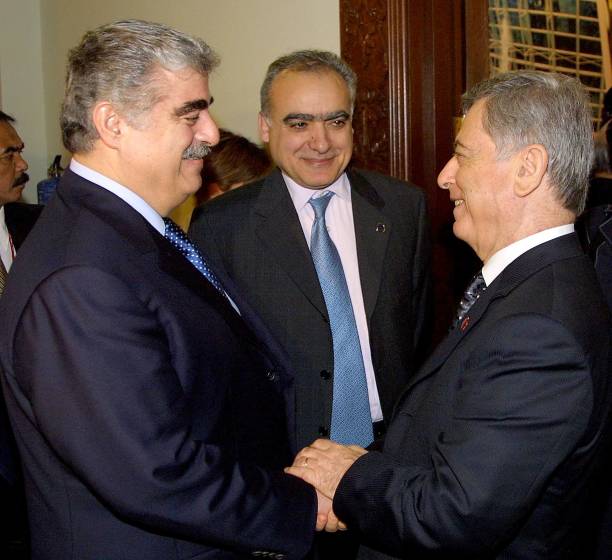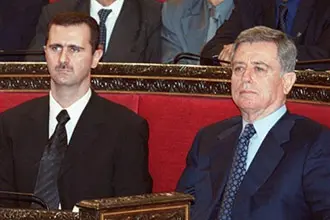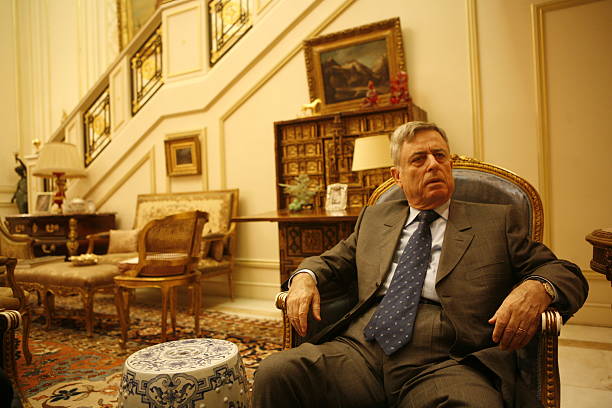Khaddam defects and detonates his bomb in the face of Assad: I did not expect Syria to assassinate Hariri
Abdul Halim Khaddam has taken the Syrian-Lebanese file to a new stage, complicating matters when he announced his resignation from his position as the deputy to the Syrian president during an interview with Al-Arabiya satellite channel yesterday evening.
Khaddam said, “I became convinced that the process of development and reform, whether political, economic, or administrative, will not proceed.”
He added, “I decided to resign, reviewed myself, and put myself in front of two choices: either to be with the homeland or with the regime. I chose the homeland because it is the true constant, and the regime is a transitory situation in the country’s history, like other regimes.”
Khaddam said that the former Lebanese Prime Minister Rafik Hariri received “threats” from Syria and President Bashar al-Assad.
Khaddam said, “I heard Hariri very harsh words, very, very harsh words from President Bashar al-Assad.”
He clarified that this happened before the extension of the term for the Lebanese President Emile Lahoud “by months” in September 2004.
Responding to a question to determine the severity of the threats, he said, “The severity lies in Bashar al-Assad saying to Hariri, ‘I will crush anyone who tries to defy our decision.’ I don’t remember the words exactly, but the words were extremely harsh. Hariri left (Assad’s meeting), his blood pressure rose, and he began to bleed from the nose. Ghazi Kanaan took him to his office and tried to calm the situation.”
Khaddam said, “On one occasion, Hariri was summoned to Damascus, and I heard this directly from three sources: from President Assad, from Hariri, and from Ghazi Kanaan (former Syrian Interior Minister).”
Khaddam added that Assad blamed the officers present for conveying “this message,” and at that moment, he realized that a mistake had occurred. He requested contacting Prime Minister Hariri, meeting him, and resolving the issue left with President Hariri.
Khaddam said in response to a question about directing threats to Hariri, “Yes, threats were indeed directed at Hariri.”
When asked if these threats were “deadly,” Khaddam said, “I mean, when the head of the security apparatus tells his visitors while playing with a gun, ‘I will act and leave,’ there are many threats, whether in Damascus or (elsewhere).”
On a question about whether the head of the relevant apparatus was Rustum Ghazali, the former head of the Syrian Security and Intelligence apparatus in Lebanon, Khaddam said, “Yes.”
Ghazali was held responsible for the conditions preceding the Syrian withdrawal from Lebanon.
Khaddam said that “Rustum Ghazali acted as if he were the absolute ruler in Lebanon,” explaining that “he insulted, in one instance, as President Hariri (former Lebanese Prime Minister Rafik) knew, and insulted Nabih Berri and insulted Walid Jumblatt.”
He clarified that he tried to persuade the Syrian President to appoint another official in place of Ghazali, whom he accused of corruption, but Assad did not do so; instead, he expanded his duties.
Khaddam said he informed Assad about Ghazali’s humiliation of Lebanese officials and that he “took $35 million from Bank al-Madina,” referring to the Lebanese bank that declared bankruptcy, and Lebanese officials accused it of funding the assassination of Hariri.
On the other hand, Khaddam said that he suspects the suicide of Ghazi Kanaan, indicating that “the Lebanese situation reflected on him (…) and they held him responsible for the accumulations in the Lebanese situation.”
In his interview with Al-Arabiya, former Syrian Vice President Abdul Halim Khaddam accused President Bashar al-Assad of monopolizing power and not seeking reforms, stating that he resigned because he was convinced that the political, administrative, and economic reform process would not proceed.
He added, “I reviewed myself and found the monopoly of power and a significant concentration of power, where constitutional institutions disappeared entirely, and the party’s leadership and the leadership of popular organizations became mere covers for decisions issued by the president.”
In response to a question, Khaddam confirmed that by “monopolizing power,” he meant “the Syrian president.”
However, Khaddam clarified that he is currently residing in Paris to write his memoirs peacefully. In response to a question, he stated, “I have not faced any harm or threats, and my relations with (President Bashar al-Assad) are good and friendly. Differences in perspectives do not change anything.”
Khaddam said, “Two days before my departure, he received me, and the conversation was friendly and comprehensive. Therefore, there is a difference in perspectives, but with mutual respect.”
He added, “I am not distant, and I did not come to Paris to distance myself. I came to write an important chapter in the history of Syria and the region.”
Khaddam accused the Syrian leadership of lacking a policy. He stated that he presented the Syrian leadership with “a set of proposals” that could form a “strategy for Syria.”
He said, “I believe that if President Bashar al-Assad adopts this strategy, Syria would not have faced the current challenges, both internal and external, because the major problem is when a state lacks a policy; it treads a path full of mines in complete darkness.”
Khaddam mentioned that the report prepared by the head of the International Investigation Committee into the assassination of Lebanese Prime Minister Rafik Hariri is “good.”
He stated that the committee’s head, German Investigative Judge Detlev Mehlis, is a “professional and well-known judge, and his report is good.” Khaddam emphasized that Mehlis “avoided politicizing the investigation, even though the crime is political,” confirming that “he has confidence in the committee, and everyone in Lebanon has confidence in the committee and its findings.”
Khaddam believed that those suspected would be revealed by the investigation.
Mehlis issued two reports after investigations lasting about six months into Hariri’s assassination, indicating the possibility of involvement of Syrian security officials in the operation. Damascus considered the reports biased.
Khaddam stated that the report is “technical,” meaning that it provided a summary of what it has, and it cannot give more information as it would harm the integrity of the investigation.
On another note, Khaddam believed that the operation to assassinate Hariri is “significant, and there is an apparatus behind it… requiring high-tech and an operational apparatus of no less than twenty people.”
He added that suggesting Ahmed Abu Adas (who claimed responsibility for the assassination in a televised statement) is “foolish,” pointing out that “the operation required a thousand kilograms, and Abu Adas cannot bring this type of explosives… I don’t think there is a sane person who would accept that Abu Adas is behind the crime.”
However, Khaddam refused to accuse a specific party, stating that “there is an investigation committee, and personally, I have confidence in it. Then we can say that this apparatus or that… this operation cannot be carried out except by a powerful apparatus with significant capabilities.”
On the other hand, in response to a question about the possibility of the involvement of a Syrian security apparatus in the assassination of Hariri, Khaddam affirmed, “We have to wait for the investigation.”
He added, “But in principle, no security or non-security apparatus in the Syrian state can make such a decision independently.”
He pointed out that “the Syrian president himself denied the accusation in an interview with Der Spiegel, saying that if there are Syrians involved, it means I am involved.”
Khaddam reiterated that “the involvement of a single security apparatus is not possible, and whether there is an implicated security apparatus, this will be determined by the investigation.”



